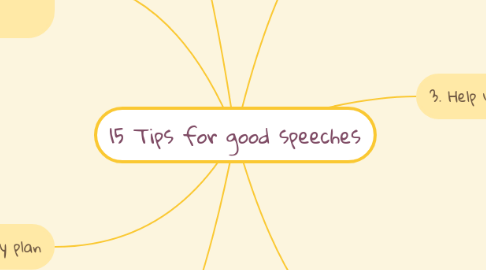
1. 1. Detach from your fear
1.1. Choose an issue that you like
1.2. Shoot a 2 minutes long video about that matter
1.3. Make a checklist of the things that you didn't like on that video
1.4. Do it all those little steps above for 3 times
1.4.1. Select the best video for the next day training
1.4.2. Repeat all this process again, until you feel comfortable with yourself making a speech
2. 2. Project a quality to deal with your fears
2.1. Transport your feelings from the past to the future
2.1.1. Try to remember what past situation you lived in the past that you couldn't handle it because of your fear
2.1.1.1. Make a checklist of your lack of abilities that avoided you to succeed in that situation
2.1.2. Try to remember what past situation you lived in the past that you could handle it successfully
2.1.2.1. Make a checklist of the abilities that you used to accomplish your goals at that time
2.1.3. Take the abilities that you used successfully in the past event and bring them to the future event
3. 3. Help your body to deal with nervousness
3.1. Use body technics to relax and prepare yourself for the event
3.1.1. You should discover some things (Rituals) that make you feel better and get them done before the event.
3.1.1.1. Brushing your teeth
3.1.1.2. Chew gum
3.1.1.3. Make yourself pee before to get on the stage
3.1.1.4. Feed yourself by light food to avoid to feel heavy during the event
3.1.1.5. Stand still in front of a mirror saying motivational phrases to yourself to raise your self-esteem up
3.2. Don't keep yourself focused only on the event, try to do some cool things such as go to the beach on the event day
3.3. Don't try to become a character during the event, just be a better version of yourself
4. 4. "Today's smart marketers don't sell products; they sell benefit packages. They don't sell purchase value only; they sell use value" (Philip Kotler)
4.1. If you are going to sell a product to the client, don't focus on the characteristics of that product, instead, focus on the benefits that the client are going to have if he buys that product
4.2. If you are going to give a speech to the audience, don't focus only on yourself, in your characteristics, rather, focus on the benefits that the audience are going to have if they watch you lecture
4.3. Always focus on intangible things
4.4. You should know well your audience before give a speech
4.4.1. You can use empathy map, which is the best tool to know better your audience
4.4.1.1. Use this tool to answer those questions
4.4.1.1.1. What do your audience think and feel ?
4.4.1.1.2. What do they see ?
4.4.1.1.3. What do they speak and do ?
4.4.1.1.4. What do they listen to ?
4.4.1.1.5. What are their struggles ?
4.4.1.1.6. What are their needs ?
5. 5. Write a contingency plan
5.1. You should make yourself prepared to the imprevisible things that might be happening sometimes, especially while you are giving a speech to the audience, in order to get through this situation the best possible way
5.1.1. You must master all the content of your speech
5.1.1.1. You must be able to deal with the risks that might happen during the event
5.1.1.1.1. When you are preparing yourself for the event, use these two magical words to make a question to yourself, "what if ?"
6. 6. Speak like Steve Jobs
6.1. The most difficult element for giving a speech is learning how to deal with people distraction
6.1.1. Always introduce the antagonist first
6.1.2. Replace long explanations for examples
6.1.3. Every ending should have a surprise, always thinking about what people don`t know that I have to tell them
6.1.4. Write a friendly subtitle and repeat it many times during your lecture
6.1.5. Keep your slides simple and impeccable and rehearse a lot, in order to not turn your back on the audience during your lecture
7. 7. Rule of three Technique
7.1. This rule exists in almost everything that you`ve ever seen
7.1.1. Books
7.1.2. Magazines
7.1.3. Advertisement

